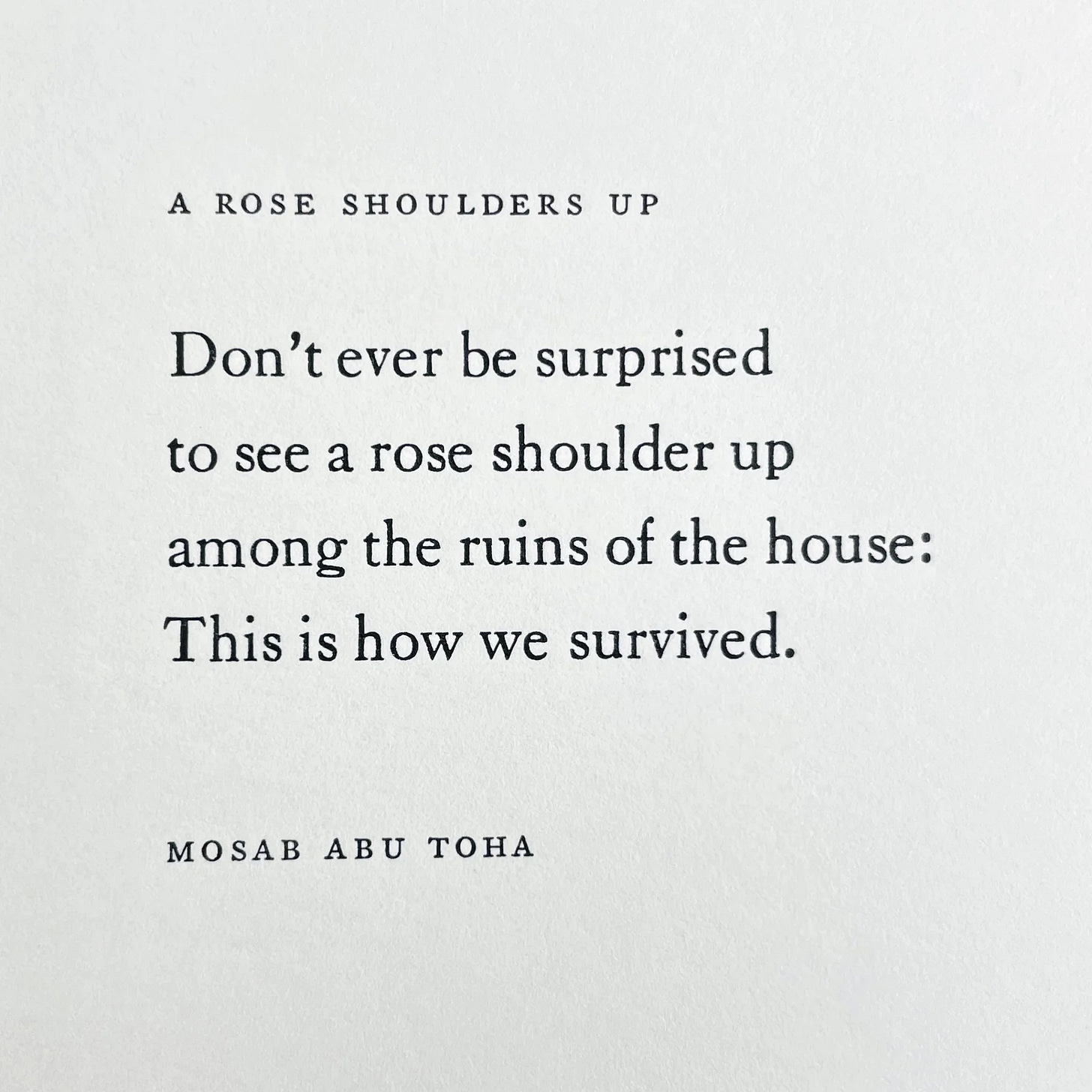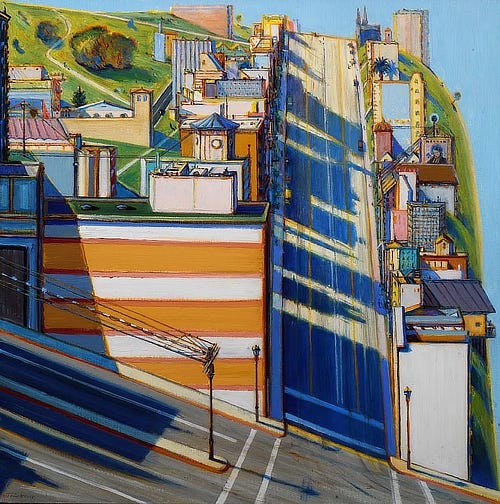Bread and Roses for the Revolution
Music, poetry, art, and dance to accompany you through whatever changes you are inciting.

In my early days as a rabble rouser, I deeply absorbed the truth and heart of labor organizer Rose Schneiderman’s iconic proclamation. She spoke these words in the wake of the Triangle Shirtwaist Factory fire in 1911. The fire killed 146 workers in the New York City factory, mostly women and children. Schneiderman’s words have inspired generation after generation of women’s rights and human rights activists around the world.
"What the woman who labours wants is the right to live, not simply exist — the right to life as the rich woman has the right to life, and the sun and music and art. . . The worker must have bread, but she must have roses, too.”
Schneiderman’s sentiments are beautifully echoed by Gazan poet, Mosab Abu Toha.
In honor of all of the activists, poets, workers, and oppressed people everywhere, I’m sharing some of the “roses” that have accompanied me over the years and given me joy and solace in a world that so often brings difficulties and pain.
with infinite love,
Shambhavi
Music
Lou Harrison, La Koro Sutro
During the early ‘90s, I attended an M.F.A. program in creative writing at Mills College in Oakland, California. The creative writing program was not famous, but the Center for Contemporary Music at Mills was the premier spot internationally to study and create work in electroacoustic and computer music. I can’t adequately describe the profound impact many of the composers and musicians who were in residence at CCM had on me. But here’s one of them.
Lou Harrison recorded La Koro Sutro in 1988, and I’ve been listening for more than thirty years.
Dance
Lucinda Childs, Dance
I saw Lucinda Childs’ Dance in NYC when it was first performed in 1979. I watch a lot of dance to this day, but I can’t say that any other live performance has ever affected me as much as this one. I still vividly recall the absolutely visceral thrill of seeing it for the first time. To me, it’s the pure joy of dance pared down to its essentials and revealed.
The piece is a collaboration with the composer Philip Glass and visual artist Sol Lewitt. The live dancers mingle with dancers on video, both life-sized and larger, projected onto scrim. In the live performance, the music is very loud and immersive. So turn it up if you want to get more of the effect!
And here’s a link to another Anda post with some very recent dance I’ve loved.
Painting
Richard Diebenkorn, Ocean Park
Wayne Thiebaud, San Francisco West Side Ridge
I was introduced to Diebenkorn by my best friend in college. She was also a painter. Diebenkorn was part of a group of California artists, including another favorite, Wayne Thiebaud, who painted with a particularly California palette of colors and whose art reflected their love-affair with California landscapes, both natural and urban.
Diebenkorn’s Ocean Park series is inspired by the Southern California coast.
Here are links to two more posts on K108 that feature contemporary visual artists, designers, and more.
Visual Magic
Anda #13 - April 27, 2024
Poetry
June Jordan, Moving towards Home
June Jordan was a prolific poet and a professor at U.C. Berkeley when I was a student there. I never took one of her classes. My bad.
A life-long activist, Jordan championed the use of Black English in poetry and other literary productions. She wrote often about Palestine and the parallels between the occupation and South African apartheid.
Jordan visited Palestinian refugee camps in Lebanon after the massacres in 1982 and returned to Lebanon after Israel’s massacre of refugees at a UN camp in 1996. Her poem, Moving towards Home, could have, unfortunately, been written today.
Moving towards Home
“Where is Abu Fadi,” she wailed.
“Who will bring me my loved one?”
The New York Times, 9/20/82
I do not wish to speak about the bulldozer and the
red dirt
not quite covering all of the arms and legs
Nor do I wish to speak about the nightlong screams
that reached
the observation posts where soldiers lounged about
Nor do I wish to speak about the woman who shoved her baby
into the stranger’s hands before she was led away
Nor do I wish to speak about the father whose sons
were shot
through the head while they slit his own throat before
the eyes
of his wife
Nor do I wish to speak about the army that lit continuous
flares into the darkness so that others could see
the backs of their victims lined against the wall
Nor do I wish to speak about the piled up bodies and
the stench
that will not float
Nor do I wish to speak about the nurse again and
again raped
before they murdered her on the hospital floor
Nor do I wish to speak about the rattling bullets that
did not
halt on that keening trajectory
Nor do I wish to speak about the pounding on the
doors and
the breaking of windows and the hauling of families into
the world of the dead
I do not wish to speak about the bulldozer and the
red dirt
not quite covering all of the arms and legs
because I do not wish to speak about unspeakable events
that must follow from those who dare
“to purify” a people
those who dare
“to exterminate” a people
those who dare
to describe human beings as “beasts with two legs”
those who dare
“to mop up”
“to tighten the noose”
“to step up the military pressure”
“to ring around” civilian streets with tanks
those who dare
to close the universities
to abolish the press
to kill the elected representatives
of the people who refuse to be purified
those are the ones from whom we must redeem
the words of our beginning
because I need to speak about home
I need to speak about living room
where the land is not bullied and beaten into
a tombstone
I need to speak about living room
where the talk will take place in my language
I need to speak about living room
where my children will grow without horror
I need to speak about living room where the men
of my family between the ages of six and sixty-five
are not
marched into a roundup that leads to the grave
I need to talk about living room
where I can sit without grief without wailing aloud
for my loved ones
where I must not ask where is Abu Fadi
because he will be there beside me
I need to talk about living room
because I need to talk about home
I was born a Black woman
and now
I am become a Palestinian
against the relentless laughter of evil
there is less and less living room
and where are my loved ones?
It is time to make our way home.
June Jordan, “Moving Toward Home,” in Living Room: New Poems by June Jordan (New York: Thunder's Mouth Press, 1993) and reprinted in Directed by Desire: The Collected Poems of June Jordan (Port Townsend, WA: Copper Canyon Press, 2007)Further exploration from K108: Poems from Palestine will introduce you to some newer and newish Palestinian poets.
Not quite ready to fire up a paid subscription, but want to show your appreciation?
Please join Shambhavi and the Jaya Kula community for satsang & kirtan every Sunday at 3:00pm Pacific. Come in person to 1215 SE 8th Ave, Portland, OR, or join Jaya Kula’s newsletter to get the Zoom link for satsang. You can also listen to my podcast—Satsang with Shambhavi—wherever podcasts are found.








